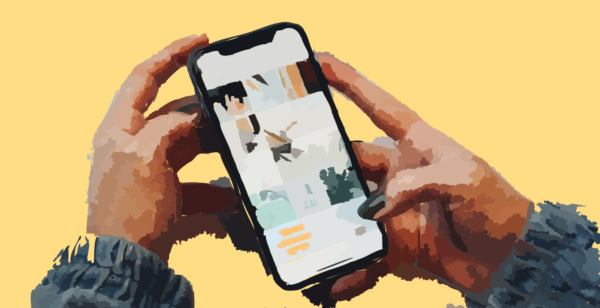We spend a lot of our lives on screens. It’s even worse in the age of bigger and better phones. If you’re like most people these days, you check your phone a lot. It’s nearly impossible to go more than a few hours without using one.
In fact, most people spend 3.6 hours on their phones every day, according to a study by the University of Derby. Picking up a phone is an unconscious habit for many of us. We rarely stop and think about the influence of our pocket computers on our present lives.
“The moment of drifting into thought has been so clipped by modern technology. Our lives are filled with distractions with smartphones and all the rest. People are so locked into not being present,” says Glen Hansard.
The problem with being constantly glued to your phone is that it takes away so much time that you could be spending on other things, like quality time with friends and family, reading, working on your side hustle or enjoying meaningful experiences.
So how do we keep ourselves from being sucked into the digital world or free up more time for the things we value?
Here are 34 easy habits to spend less time on your phone and spend more time doing meaningful things that can help you enjoy life to the fullest.
1. Start with a goal.
What do you want to do with your new free time? Identify as many activities or experiences as possible. You will go back to doom scrolling if you don’t have anything else to do.
2. Aim for reconnection.
“The smartphones and the computer separates everybody, makes you think that you don’t need nobody else.” — Bootsy Collins
3. Knowledge of how you use your phone can help you limit unproductive usage.
Measure how much time you spend on the many apps on your phone. Track your screen time for insight.
4. Turn off all notifications.
Stop reacting to every notification. It’s the best way to reduce screen time. Be deliberate about app usage.
Pro tip: If you use workplace productivity apps like Hive, be sure to customize your notification settings for only the things you need to see in realtime. For example, you can keep your chat alerts turned on if you know you need to get back to someone instantly and are on-the-go. On the other hand, you may want to silence your notifications for new task assignments if you know you will check them on your computer anyways.
5. Move unproductive apps off your Home Screen.
Hide them in folders or create an extra step to access them. It’s a massive time saver.
6. Delete apps you haven’t used in a month.
We have more apps than we actually need. A few useful apps mean you will spend time doing something worthwhile. You can also delete similar types of mobile apps to reduce visual clutter and make sure you only have the ones you actually need.
7. Use your “do not disturb” feature.
When you start deep or focused work, silence all triggers to get things done.
8. Reduce visual stimulation.
Make it less attractive to look at. I use dark wallpaper, and there’s much to see when I pick up my phone.
9. Take time off from screens.
“Taking a month to cleanse yourself from screens as much as you physically and possibly can, not shooting for perfection but just shooting for connection.” — Shanan Winters.
10. Make social apps less enjoyable.
Change their Color settings if you can. Or better still, use the grayscale or black and white feature on your phone.
11. Set personal phone usage rules for yourself.
This is especially important when spending quality time with friends and family. Similarly, understanding how children use their devices can help parents implement internet safety measures for kids effectively.
12. Write down how you want to spend your free time.
Stick it where you can see it every day to remind you to do them instead of picking up a phone in downtime.
13. Try phone-free mornings.
Instead of picking up a phone first thing in the morning, try other productive activities like exercising, reading or working on your most important tasks for the day.
14. Don’t turn your phone into a television.
Limit entertainment to a TV set. Every entertainment app on your phone makes it even harder to stay away from the phone.
15. Don’t just read on your phone.
Get a physical book. Once you start using your phone, you are more likely to check updates on other apps.
16. Pick up the phone for a productive reason.
Don’t just browse messages or scroll through social media updates every time you are free.
17. Set a screen time goal.
How much time do you want to spend on your phone? How will you use that time when you pick up your phone?
18. Use apps to monitor how you spend time on your phone.
Write and set goals accordingly. Apps like Moment, Freedom and Forest can help you limit access to certain apps.
19. Use dark mode at night.
If you must use your phone for anything important in the evening, change the theme to dark mode. It’s easier on the eye.
20. Get rid of vibration mode.
Every time you hear a vibration, your brain resets and uses more energy. It distracts you from focus work.
21. Put your phone away from sight when you are doing mentally challenging work.
Or better still, put it in silent mode before you keep it out of sight. You need all your brainpower for deep work.
22. Establish phone-free zones.
Dinner time, family time, and work time are opportunities to get away from your phone.
23. Get a new hobby outside work that requires no screen time.
Reading, painting, crafts, and journaling are better downtime activities.
24. Don’t let your phone be the first and last thing you see.
If your phone is the first and last thing you see, replace those screen times with meaningful or calming activities.
25. Schedule time with and without your phone.
What do you need to do when you hold your phone and plan times when you are not using it.
26. Replace social media with educational content.
If you tend to doom scroll on social media apps, replace social media time with educational talks or videos. Try social media detox for at least 30 days and make a habit out of it.
27. Mute specific apps.
If turning off all notifications is not an option, mute or disable sound for all apps that tend to get your attention the most.
28. Utilize airplane mode at night.
Just before you sleep, put your phone on flight mode. It’s the best way to avoid getting sucked into messages or notifications when you get up.
29. Take regular walk breaks to stretch and move.
It’s the perfect opportunity to keep your phone out of sight and get fresh air or clear your head.
30. Prune your social feed.
Unfollow people who don’t inspire, motivate or encourage you. You don’t need time wasters in your life. ]
31. Establish better morning and evening routines.
If how you start your day and end it is solid, you will find less time to waste on apps you don’t need.
32. Use dark lock screen wallpaper.
The first picture on your screen is the gateway to your phone. Make it a deterrent: try a boring picture.
33. Put your phone to productive use if you keep picking it up.
Organize your apps into folders. Create a playlist for work or get learning. Use an exercise or mindfulness app to destress.
34. Make the most of your screen time.
Whilst you work on minimizing screen time, find ways to maximize positive experience time.
This article originally appeared in Medium.






